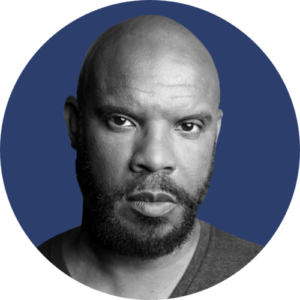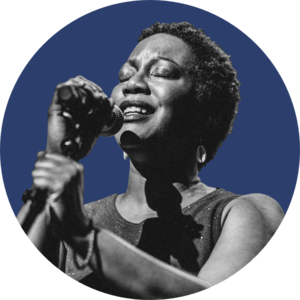As African Americans ventured into entrepreneurship following emancipation, their success was met with overwhelming vitriol and violence from their white counterparts throughout the nation, resulting in Black Codes that make their advances toward equality all the more difficult.
Still, in the face of these challenges, freed people persisted in their pursuit of livelihoods, organizing around their common goals for equal opportunity under the law. These early efforts resulted in sweeping changes in Congress that would lay the foundation for years of civil rights endeavors to come.
View Transcript
Kidada Williams: Previously, on Seizing Freedom:
John M. Washington: I felt for the first time in my life that I could now claim every cent that I should work for as my own. I began now to feel that life had a new joy awaiting me.
Martha Thompson: How do I make a living? I leave my baby with a neighbor and then come and pile cord wood in this here yard.
Garrison Frazier: I would prefer to live by ourselves, for there is a prejudice against us in the South that will take years to get over…
New Orleans Tribune: Just about the time that this devilish assassination was committed, the rebels, unable to stand any longer with arms in their hands, were on the point of being pardoned, restored to their rights in the Union, and permitted to rule—and oppress—the people in their States, as they did before.
(Sound of gavel banging)
Sarah Nash: The meeting will come to order.
KW: On May 21st, 1866, Sarah Nash called a meeting of the Virginia Black Hucksters—women who made their living selling small goods door to door, or at the local market.
SN: My friends, we meet here to consult each other and talk our troubles over. So much is being done against us in this city that I don’t know where to begin, nor what to say.
KW: Sarah gathered them to discuss and dispute unfair taxes being levied against Black laborers. They formed a kind of union, made up entirely of Black businesswomen.
SN: We don’t know nothing about the laws, and they make us pay all the city, state and government taxes before the time has run out on what we have already paid. I know we are left all alone and no one to give us any advice. Our old rebel masters, (that they used to be), because they can’t get our labor now, say our freedom shan’t do us any good. Don’t it seem like it?
(Sounds of approval from Huckster women in attendance)
KW: The Hucksters met just a year after Abraham Lincoln had been assassinated. Andrew Johnson was comfortably in the White House—doing everything in his power to keep Black citizens, like Sarah Nash, from any sense of liberty, or peace.
Andrew Johnson: This is a country for white men and by God, as long as I am President, it shall be a government for white men.
KW: Johnson’s vision for Reconstruction was one in which the Civil War would be memorialized as a conflict with “good white people” on both sides. Ex-Confederates would be welcomed back into leadership with token apologies—not for slavery, of course, but for taking their “passion” for independence too damned far.
Phillip Bell: The war does not appear to us to be ended, nor rebellion suppressed.
KW: Phillip Bell, a Black abolitionist, insisted that this version of Reconstruction was a fraud.
PB: They have commenced reconstruction on disloyal principles. Instead of pursuing a system of “liberal, but judicious hanging,”…the Government appears to have adopted a system of liberal, but injudicious pardoning. Already we see the fruits of this failure on the part of the Government to mete out full justice to the loyal Blacks, and retribution to disloyal whites.
KW: On the contrary, disloyal whites were emboldened by President Johnson’s rhetoric. Ex-Confederates returned to their State houses in droves. The old oppressors, in new clothes, were adamant about cementing the status quo into law.
Mississippi State Legislature: Be it enacted by the Legislature of the State of Mississippi…
William Head: Three white men said we’d better not start building til we knew we were permitted by law, or there might be some shooting at our cabins.
Georgia Freedmen: We learned that we were to return to the plantation and work for our former owners at a reasonable contract as Freemen…and our old and infirm mothers and fathers and our children would not be provided for.
Henry Mars: We as a people ask for our rights. We acknowledge that we are free but we are not allowed to enter into public business here in Shelbyville…
Tennessee State Legislature: Be it enacted by the General Assembly of the State of Tennessee…Colored persons are not given the right to vote, hold office or sit on juries in this State.
Kentucky State Legislature: Be it enacted by the Legislature of the State of Kentucky…
Louisiana State Legislature: Be it enacted by the Senate and House of Representatives of the State of Louisiana
Florida State Legislature: By the State of Florida
South Carolina State Legislature: By the State of South Carolina
Virginia State Legislature: By the state of Virginia
Alabama State Legislature: By the state of Alabama
Arkansas State Legislature: By the state of Arkansas
KW: These laws restricted everything about how and where Black people could sustain themselves and their families, and formed the backdrop of the Virginia Black Hucksters’ meeting. Because their work was subject to state regulation, Sarah Nash and her comrades felt the effects of Black Codes, and extraneous taxes, first-hand.
SN: Friends, for the last 30-odd years, when many of you were children, I have been keeping a cook shop, and now I must stop because I ain’t got fifty dollars to pay into the hands of the collector for one year’s taxes. I don’t make that much in two years!
Huckster Woman 1: The civil authorities have turned our husbands and children from the public, or city works, and given all such labor to the enemies of the Union.
Mrs. Hodges: I have it on good authority that this tax money is taken more to support the widows, orphans and invalids of the confederate army than any other purpose!
Mrs. Sarah Hudgins: And yet, throughout all the trying scenes of a four years’ war, the government has ever found us true as steel to the country, its soldiers and sailors, collectively and individually…and that for the deliverance of our Republican government, we have laid our children—some of us, our only child—upon the altar of the country.
I have here a bill bearing the name of a Mr. John H. Burroughs, the City Inspector, for Huckstering privileges in the market, which does not expire until June 30th of ’66.
(Sounds of agreement from Huckster women in attendance)
Mrs. Sarah Hudgins: And as we are licensed to that date they say we shall, per force, comply with any and all conditions laid upon us.
SN: Let them break me up, put me in jail, or do what they please with me, I say I am done serving them, by the help of God and the U.S. Army.
KW: The Virginia Black Hucksters—like most freed people—had a robust understanding of what making a free living could look like. Together, they composed a public letter to the Commissioner of the Freedmen’s Bureau, urging all levels of government to give them the legal room they needed to run their businesses.
Mrs. Hodges: Your Honor, we have never been consulted in the first instance touching our obligations to a new levy, but are being forced on the moment, by arbitrary power, or suffer the consequences of fines and imprisonments.
Huckster Woman 2: With more persecutions than we can by any possibility present in detail…Your Honor will no doubt conclude that something should be speedily done to lift this intolerable burden from our shoulders; especially when knowing that our husbands, though called upon to pay a head tax of four dollars, have no voice in making city, state or national government.
SN: We pray that the measures thus forced upon us will be so modified that we may pursue our legitimate calling, as we have done no violation to the government.
Mrs. Hodges: We are representing many hundreds here who huckster for a living.
SN: Yours Very Truly,
(Huckster women, in unison): Sarah Nash, et al.
KW: I’m Dr. Kidada Williams. This is Seizing Freedom. Today’s episode is the second in our series on making a living. In part one, we saw how Black people moved quickly after the war to secure the means to make an independent living, to control the products of their labor, and how those efforts were met with push-back from white actors.
Today, we’ll see the ways Black people fought to protect what they gained in Freedom. From hucksters lobbying for tax relief, to domestic workers leading wage strikes, Black people used the communities that emerged from common labor to build new lives.
The threat of Black people’s success led former Confederates to weaponize the law against them, cementing their power through violence. But in spite of everything, Black people managed to flourish, and push to both guarantee their freedom and protect the futures of their children.
We’ll start in Memphis in 1866; that same spring that the Virginia Black Hucksters started organizing. Memphis had both an office of the Freedmen’s Bureau and a stationed Union garrison that attracted large communities of freedom seekers. But as freed people migrated from rural to urban areas—seeking family and work—land, opportunity, housing, and white patience were often at a premium.
Rev. Ewing O. Tadé: The Irish have an intense hatred for the negroes because they are afraid they will take away their work.
Benjamin Runkle: There was a conflict of labor between the Irish hackdrivers, porters, and laborers…and the negroes employed in the same occupations…
Marland H. Perkins: …the Irish feeling that the negroes are trespassing upon their rights, thinking that they have the privilege to do this labor. I have seen this antagonism manifested in many other places besides Memphis, but nowhere more bitterly.
KW: After the war, the occupying Union military in the South was mostly Black. The Memphis police force was entirely white and mostly Irish—who had been shunted to low-paying jobs by other white Americans that had been in the country longer.
But rather than addressing class disparities, local politicians and newspapers stoked racist fears and pitted the Irish against their Black neighbors. In the spring of 1866, disputes between the soldiers and police were nearing a fever pitch.
Sgt. Joe. Brown: I was sitting in my own door on Sunday night the 10th of September, about dark, and a policeman who lives opposite to me said to me “I wish I could get a chance to kill all the damned n— soldiers.” And I said “You can’t kill me!”
KW: Black soldiers had returned to old landscapes of the South, with a new sense of dignity. For white southerners, still seething from the Confederacy’s defeat, there was no more visible reminder of Union victory—and the threat to their supremacy—than the sight of Black men in uniform.
SJB: He then stepped back a few paces and ran up and struck me with his club on the head. Another policeman came up and struck me several times and they threw me down and stamped me in the back while lying on the ground. My shirt was torn off and I was badly bruised. The man who I rent off saw this and knows the policeman. They tried to take me to the station house and I told them I would not go, and about this time the patrol came along and took me to prison.
KW: White men in Memphis turned to violence to reassert their authority. Anonymous notes like this one (which got reprinted in a local paper) were dropped off at school teachers’ and Bureau agents’ houses:
Anonymous: You will take notice that we have determined to rid our community of negro-loving fanatics and philanthropic teachers of our former slaves. You are one of the number, and it will be well for you if you are absent from the city by the 1st of June. Consult your safety.
KW: But the mob didn’t wait for June. On May 1st, 1866, the Black Union garrison was finally demobilized. The soldiers’ pride turned into boisterous celebrations that spilled into the streets. A group of white Memphians—including the Attorney General and the majority of the police force—began following the crowds, waiting for their chance to strike.
Adam Lock: There was a company of soldiers at the fort who came out and went down South Street, keeping up a mighty racket…some sixty or seventy altogether.
James E. Donahue: There were a great many white policemen among them on the first night of the rioting.
AL: They crossed the bridge down on South street, when one of the soldiers shot up into the air. One of the policemen whirled round and shot into the crowd of soldiers.
JED: I saw three shots fired, and I believe they were fired by the policemen, at a house where there were some women and children. I heard them say that they were going to kill every damned n— in Memphis.
KW: The violence lasted for days, and policemen were soon joined by masses of white Memphians.
Lavinia Godell: My husband, Jackson Godell, went out of the house to get some meal. A few minutes after, a sister of the church who lives next me came in and said, “Sister Lavinia, Jackson is killed.” When I went out, he was lying and only groaning. I sat with his head in my hand.
KW: By the time the carnage ended, every Black church and school building in Memphis had been burned to the ground. Of the 50 people who were killed, 48 of them were African Americans—men, women, and children. Neither of the two white people that died were killed by someone Black.
In the investigations that followed, representatives from the Federal and State government questioned citizens about what they experienced. Hundreds of people testified and risked retaliation. Survivors gave accounts of physical violence, paired with detailed lists of property damage and loss.
AL: I saw a man put fire to my house and kindle it a second time…I went out and threw a bucket of water on the fire, and they shot right against the place where I was standing…I had some valuable things for a colored man, and I wanted to go back in and get them. I had not been standing there ten minutes, when they broke in and broke open my trunk and took out the things.
Henrietta Cole: Old man Mike Pendergrass and his two sons, John and Pat, and a number of other men came to the house of myself and husband, and stole from me clothing and property to the amount of seventy five dollars.
John W. Lane: I met a party of white men on Mulberry street who robbed me of twenty dollars and twenty five cents and tore up my license for a grocery store.
Lucy Hunt: They set fire to my things and pushed me back three or four times into the fire. One of them caught hold of my throat and said, “I am going to burn you up.” I believe they would have burned me up if the soldiers had not come.
Chairman: How much property did you lose?
LH: They broke open my trunk; I had $325.
Chairman: Where did you get all that money?
LH: I had been at the fort and had done cooking for Company D for sixteen months.
KW: These descriptions of robberies and assaults—and the suspicion about how Lucy Hunt earned her living—point to one of the key triggers of the massacre: white rage in the face of Black people’s success.
Editorial in The Avalanche: The late riots in our city have satisfied all of one thing: that the southern men will not be ruled by the negro…
KW: Confirmed in this editorial of a rebel sympathist newspaper, was the fact that rioters pillaged and burned the Black community because they knew there were resources to take. Destroying Black people’s livelihoods would diminish their competition in the labor market.
Editorial in The Avalanche: Negro men and negro women are suddenly looking for work on country farms. This is right: the country farmers need their labor, and can pay for it better than the town can. They must become producers instead of being consumers. Thank Heaven, the white race are once more rulers in Memphis.
KW: These kinds of attacks played out in multiple cities, as freed men and women ran headlong out of slavery towards independence. Because, just like they were in Memphis, Black people were on the move across the country—fleeing conflict, pursuing loved ones, securing opportunity, and laying foundations for their kids. They found joy in financial and professional success.
Mattie Curtis: I’ll never forget my first bale of cotton and how I got it sold. I was some proud of that bale of cotton, and after I had it ginned I set out with it on my steer cart for Raleigh.
KW: But entrepreneurs like Mattie Curtis also knew how precarious their situations were. And Mattie understood that her success could also bring immediate backlash.
MC: The white folks hated the n— then, ‘specially the n— that was makin’ something, so I dare not ask nobody where the market was. I rode all day and had to take my cotton home with me that night ’cause I couldn’t find no place to sell it at. But that night I thought it over and the next day I asked about the market.
KW: Mattie surely needed to sell her cotton to live, but she probably hoped to do more with the fruits of her labor than feed herself. Making a free living was about more than having the resources to cover basic needs; It was also about having the freedom to choose what to do with your time, to enjoy leisure.
Peter Johnson wasn’t rich by any stretch of the imagination. But he set aside some of his money to show off his freedom, just because he could.
Peter Johnson: I live in Vicksburg, in the bottom next to the railroad tracks. But they can’t keep me out. I’m in the habit of going up the hill into the white-owned grocery store, lighting cigars and taking drinks, too, when I feel like it.
KW: In the late 1860s, a growing class of professionals—like student Susan Bruce—spent their time off at public speeches or high society events.
Susan Bruce: I went to hear Miss Anna E. Dickinson speak last night. Isn’t she splendid? I think she puts Emerson in the shade entirely. She was dressed in a black dress (empress cloth I guess) with gold chain, diamond ring, emerald ring (it looked like), bracelet (with a flashing little gem in it) and point lace. Quite superb, but not equal to the words!
KW: New holidays came with new ways to celebrate: feasts, parades…even baseball. Judson Henry, owner of a cafe in Hawkins, Texas, recalled stepping up to the plate one Juneteenth, years afterward. The score was tied at two, against the town’s arch rival…
Judson Henry: And, and we had such a crowd out there in those days till what they’d do, they’d split this money equally among the players. And this was money now. I come up with two outs, two strikes and I hit that ball right across the centerfield fence. And man, you talking about…when they got through having a time down there they brought me up $16.
KW: Making money was often still a part of the fun, especially for children with fewer means like George Dorsey.
George Dorsey: I caught the only grey eagle that was ever seen ‘round here…An old colored fiddler, named Fred Roberts, wanted to buy it from me and before I could say anything he said, “I’ll give a dollar for him.” That was a lot of money for me and, boy, like I sold him then and there. I coulda got two or maybe three dollars for him. Fred took him to town and fed him live hens and raw meat. On court days or when there was a crowd in town he showed him for ten cents a look. I bet he made $50.00 on him. People used to come for miles to see that eagle…
KW: Even if you were mostly living hand to mouth, there was almost always time to dance. During slavery, people danced to celebrate, to play, to worship, to mourn, to find partners.
Anonymous Kid: There used to be some awful times during slavery days. Work! Work! Work! from dawn to dusk. But in spite of all the work and strictness some of the slaves used to slip from place to place after night and find a little pleasure. One night all the older slaves on our plantation slipped off to a dance. I was young, too young to go, but I went along anyway.
KW: White plantation owners knew that a release from work kept up morale, so they encouraged dancing—but only at specific times. Black joy overall, and dancing in particular, threatened the social order. It’s hard to control a dancing body. To white people wishing to control Black people and their bodies, masses of folk dancers in solidarity looked like a rebellion.
AK: While everybody was having a time dancing I spied somebody slipping up from the thicket beyond. I was sitting by the fire but I was afraid to say anything. Soon a whole band of paddy-rollers were on horses and they almost overtook some of us. We snatched some grapevines from the trees and stretched them across the road. Then they rode into these—they did such cursing and swearing as you never heard. We all got home and into bed in no time.
KW: Of course, Black people danced throughout all white people’s scheming about whether they were “allowed” to or not, on plantations and in cities, in secret if they had to.
AK: The next morning some of them came around inquiring about who of us had been out the night before. I told them that I wasn’t there and didn’t know nothing about it. One of them told me if I didn’t tell, they would tie me and give me forty lashes. I was stubborn, but when they commenced tying me I started to belching. I told on everybody. I know it was wrong but I did it to save my own hide. Nobody got any whipping though, but that was the last time I got to go along with them to a frolic.
KW: During Reconstruction, even public dances weren’t without controversy. Black reformers concerned about “respectability” saw them as dens of sex and sin. Whites complained about the sound of Black joy, calling police to break up parties.
Whether private or public, these spaces laid the foundation for the jook joints to come, where free Black people could gather, gamble, drink, dance and spend their hard-earned money. By the turn of the century, jook joints were everywhere. Leola Pettigrew remembers spying on the clientele of the honkey-tonk her dad owned in 1901:
Leola B. Pettigrew: They did everything. I remember the Slow Drag, of course, that was very popular—hanging on each other and just barely moving. Then they did the Fanny Bump, Buzzard Lope, Fish Tail, Eagle Rock, Itch, Shimmy, Squat, Grind, Moche, Funky Butt, and a million others. And I watched and imitated all of them.
KW: Leola would grow up to be a blues and vaudeville singer and songwriter, and take the stage name Coot Grant.
Moments of delight in dancing—but also in music and food and culture—are all over the archives. Even while we’re following the story of how difficult it could be for so many people to make a living, it’s important to know that those same people never lost sight of what makes Black life worth living.
Freed people emerged from slavery with the desire to thrive in their freedom. For many, federal aid from institutions like the Freedmen’s Bureau was essential to making good on those ambitions.
But after the massacre in Memphis in 1866—one of the first organized acts of mass white terror following the Civil War—it was clear to Black Americans that protecting their lives and livelihoods wasn’t something they could leave to the local—or even federal—government.
Orrin E. Waters: I should have added in stating the number of buildings burned down that there was also a storehouse belonging to the Western Freedmen’s Aid Commission—a government organization for the support, advancement, and education of the colored people of the South. The storehouse held supplies for freedmen. The total amount of supplies and property burned was $4,597.35.
KW: Like Black soldiers, relief groups were a visible reminder of federal investment in Black people’s advancement out of slavery. So it’s not surprising that the outpost in Memphis—part of the Freedmen’s Bureau—was a target of the mob.
Since its inception, the Bureau had been under assault by northern white conservatives. When the bill to establish the Bureau came before the House in 1864, Ohio Democrat Samuel Cox denounced the use of Federal Funds to support freed people.
Samuel S. Cox: It may be that all of the four million slaves will be thrown upon the frigid charities of the world. But sir, if slavery be doomed so, alas, is the slave. No scheme like this bill can save him. No Government farming system, no charitable Black scheme can wash out the color of the negro, change his inferior nature, or save him from his inevitable fate.
KW: The formerly enslaved, he argued, were naturally dependent. They could never be self-sufficient. So Cox was decrying what he saw as a push to shift the so-called “Negro burden” from slave holders to the federal goverment. For the same reasons, President Johnson tried to defund the Freedmen’s Bureau in the first year of his presidency.
By attacking the Bureau, whether through rhetoric or arson, white conservatives were targeting the support systems that fortified Black success. White employees of the Freedmen’s Bureau— charged with providing resources and stability to help African Americans thrive—at times undermined the Bureau’s efforts, and weakened its impact.
In cities in particular, the needs of freedmen compounded under the steady flow of new arrivals. Strapped for cash, the Bureau tried financing the resources for their support by getting lawmakers to levy taxes—taxes exclusive to Black people.
Merrimon Howard: Our old women, blind, and imfirm are thrown out to starve. Orphan children forgotten and forsaken, yet the freedmen & free men must pay their tax and all persons of African descent must get a license for remaining in any city or town.
Florida Black Grocers: Dear Sir, We the undersigned, colored grocers of this city, take this method to present ourselves to you. We protest against the crushing taxes that are charged by the civil authorities as unbearable, under the circumstances. If we do not keep such establishments to protect our people against paying the Rebels such a high price for what they need, what will they have at the end of the year to begin with?
KW: Lawmakers in Washington tried funding the Freedmen’s hospital there with a budget sourced near-exclusively from taxes on Black residents. Many rejected this type of forced solidarity. One group of cooks petitioned the Secretary of War to lift the tax.
James C. Waters: Many of us have been employed in the Quartermaster’s Department for two years past, and have never yet received wages averaging more than twenty dollars per month…
John H. Slocum …from which have been deducted a tax of five dollars per month for the assistance of the numerous freed men, women and children that have been and are now stationed within the limits of the district one percent for the hospital fee.
Robert A Stanley: …leaving the paltry sum of fourteen dollars eighty five cents as monthly pay.
JCW: In view of the fact that we are “A Portion of that Class of Colored Men (termed free)” and pretending as we do to have some faint conceptions of the value of our labor…
JHS: …we regard this as being unequal to the service we render and the demands of the times.
RAS: We therefore humbly beg an interference upon Your Honor’s part for the removal of the above mentioned contraband tax.
KW: These men, like thousands of others across the country, weren’t so much against the value that the tax brought, in principle, but they were opposed to the idea that the plan wasn’t self-generated or empowering; it was extractive, even if it was for a good cause.
But pushing a cause onto Black citizens without their input was a refrain throughout Reconstruction—especially when it came to telling them what to do with their money. And it was the downfall of another government plan farther south.
In 1866, Union General-turned Bureau Agent Clinton Fisk was in charge of preventing the spread of cholera in Tennessee and Kentucky, which was having a devastating impact on poor communities of color. Fisk knew he needed to make major changes in infrastructure: to create a more advanced sewage system, to provide housing for the thousands of people who were migrating, looking for work, and to build hospitals and hire doctors. All of which required money.
Clinton Fisk: Let there be appointed in each city and town a freedmen’s sanitary commission composed of five colored men—leading freedmen—who will be authorized to assess and collect the sum of one dollar from each colored person between the ages of eighteen and sixty years, residing in said city or town or within one mile of towns or city limits to constitute a hospital fund. The fund so collected will be deposited in a savings bank, subject to the control of the commission for hospital purposes only.
KW: To Fisk, a white outsider, the plan was solid: Have trusted Black citizens collect money from freedpeople to fund a Black hospital. To the community, though, it hardly seemed legal—let alone fair—to selectively burden Black citizens with an additional tax that whites did not have to pay. One African American minister wrote a private letter to a Union officer, stating that:
Minister: My opinion is against the legality of all special taxes upon colored citizens, either by the federal or state government, or the Freedmen’s Bureau. I’m reluctant to speak of it publicly, since I do not wish to disappoint the efforts here for the protection of public health.
KW: Within a month the plan was a failure, with leagues of Black citizens refusing to participate. Fisk’s forced solidarity failed—not because Black people didn’t want to support one another, but because they didn’t have a say in how it happened. They already knew mutual support was necessary. It sustained community and culture during slavery, and it was essential to the next phases of their lives if they were going to keep safe from white violence.
Major cities came with more opportunities for elected solidarity—the kind that meant safety in numbers, but also stronger bargaining power. In urban centers, washerwomen formed interest groups and made collective decisions, similar to the Virginia Black Hucksters.
But washerwomen were in a unique position. Unlike other domestics who worked and often lived with their employers, they exercised their trade from their own homes. They could set and modify their own schedules and enlist friends or family members to lessen the workload. Dinah Campbell, in Atlanta, stepped in to support her relatives when one of her siblings died.
Dinah was no doubt motivated by a strong commitment to her family. But that sense of obligation wasn’t limited by blood. Mandy, another washerwoman and friend of Dinah, explained how they helped look after other members of their community.
Sister Mandy: Since Sister Jane done got no count for work, Sister Ann come along here and asked us to take her in. We done it, and when she ain’t workin’ out she helps us with the washin’ and ironin’. We call her sister sure enough, though Jane ain’t no kin to us.
KW: The ability to take care of yourself and your community helps define your self-esteem. It’s harder to settle for the bare minimum when you understand your worth and ability. But, like most free people at the time, washerwomen were often underpaid for their labor.
So in 1866, in Jackson, Mississippi, as local washerwomen gained greater independence, they decided to combine their influence to bargain for higher pay—and strike, if necessary. The laundresses were explicit about their demands, which were published in the Jackson Daily Clarion newspaper for everyone to see.
Washerwoman 1: Whereas, under the influence of the present high prices of all the necessaries of life, and the attendant high rates of rent, we, the washerwomen of the city of Jackson, State of Mississippi, thinking it impossible to live uprightly and honestly in laboring for the present daily and monthly recompense, and hoping to meet with the support of all good citizens, join in adopting unanimously the following resolution:
Washerwoman 2: Be it resolved by the washerwomen of this city and county, that on and after the foregoing date, we join in charging a uniform rate for our labor, and any one belonging to the class of washerwomen, violating this, shall be liable to a fine regulated by the class.
Washerwoman 3: We do not wish in the least to charge exorbitant prices, but desire to be able to live comfortably if possible from the fruits of our labor. We present the matter to your Honor, and hope you will not reject it. The prices charged are: $1.50 per day for washing, $15.00 per month for family washing, $10.00 per month for single individuals. We ask you to consider the matter on our behalf, and should you deem it just and right, your sanction of the movement will be gratefully received.
(Washerwomen, in unison): Yours very truly, the Washerwomen of Jackson.
KW: These women formed the first recorded labor union in Mississippi state history. We don’t know what became of the Jackson washerwomen and their demands, but we do know that their actions had an influence.
Their resolution triggered a chain reaction among Black laborers—men and women—that resonated through the South for decades. In Nashville, Charleston, Richmond, Savannah, and New Orleans, Black workers walked out of lumberyards, left brick mills, refused laundry, and abandoned cotton fields to strike for higher pay.
Organization wasn’t a straightforward process. In Washington, DC, forming a collective of Black workers was especially difficult. And it called for a different strategy than the ones used in Jackson in 1866. In Washington, thousands of wartime refugees and migrants flooded into the city, but jobs were scarce, and those that were available quickly went to unionized white laborers.
Anthony Bowen: Prejudiced and unthinking people speak of us as ‘hordes of lazy contrabands’ and as ‘idle negroes,’ while they little know our desire for honest employment and the difficulty we find in obtaining it.
KW: Into this mess stepped Anthony Bowen. Born into slavery, he bought his own freedom in 1826. His house had been a station in the Underground Railroad. He helped found the first free public school for Black children in Southwest Washington, and the first Black branch of the YMCA. When Bowen spoke, Black and white influencers listened.
AB: Contractors’ prejudices are against their real interests and that of every citizen, as they have now to buy their labor in a market where there is no competition, and the few control it for their own profit.
KW: By 1867, the city couldn’t afford this prejudice. Masses of troops moving through had destroyed its streets and sidewalks. Inadequate sewers and untamed riverbanks flooded the city with filth. DC was in such rough shape that many officials proposed cutting their losses, and moving the nation’s capital to St. Louis. Anthony Bowen wanted to save the capital by giving skilled African American laborers a fair share of the public works jobs that were necessary to fix it.
AB: It is my hope that the time would soon come when a change would occur in the municipal government, and the colored man would have an equal chance with the whites to gain a living in this city.
KW: Over the next year, activists joined the call to form the Lincoln Radical Republican Laboring Association, and lobby for fair distribution of public works jobs. In 1868, almost 5,000 laborers signed a petition—not for aid, but for representation. Not for money, but a fair chance to earn it.
AB: We request that men may be put in charge of this public work who are not unfriendly to our people, and who will give us a fair share of the employment under their direction.
KW: The summer they drafted the petition was also the first summer that Black men were allowed to vote in the upcoming DC mayoral election. To ensure their demands were met, they enlisted a sympathetic white Republican candidate with a civil rights track record. Ironically, his name was Bowen, too. Sayles Bowen.
Sayles J. Bowen: I rejoice that you should assemble here for the purposes of asserting and securing the rights of your race in the main penance of the rights of labor. The great and final battle for freedom having been fought and won, it is but proper that, as soldiers, citizens, and patriots, you should secure and take the necessary steps to properly preserve the fruits of the victory. Labor gives energy and activity to the intellect!
KW: The election was extremely close, but Sayles came out the winner. Conservatives cried “election fraud,” and their incumbent refused to leave the mayor’s office. They tried to delay the election results, but failed.
As mayor, Sayles Bowen kept his campaign promises to the Lincoln Radical Republican Association. During his term, thousands of Black and white laborers graded the streets, shored up the riverbank, repaired sidewalks and installed sewers.
It might be disappointing to see the beginnings of DC’s Black labor movement riding on the success of a white politician. But in this story, Black laborers had agency, and their own strategy. They identified someone who could represent their interests, and enjoyed the fruits of political patronage; that wasn’t the case when the Freedmen’s Bureau tried to force Black laborers into solidarity in Tennessee and Kentucky.
Once they could tie themselves and their labor to the political machine, new possibilities opened up for collectives of Black workers. In December 1869, the year after the DC mayoral election, Washington hosted the first Colored National Labor Convention. It was five days of passionate speeches, resulting in petitions to Congress.
J.M. Langston: Knowing ourselves as members of the great American body politic, with unfettered limb and manly endeavor we shall labor with our white fellow countrymen, native and naturalized, in mine, on farm, in workshop, in foundry, in factory, everywhere, to develop the material and industrial powers of our land, making wind, water, and earth to aid in the accomplishment of its mission of liberty and law, honor and justice, Christianity and civilization!
KW: It elevated municipal labor organization to the national level:
Telegram from the Secretary of State elect of Mississippi: Seventy thousand triumphant colored Radicals send greetings from Jackson Mississippi!
KW: Delegates discussed everything from fair union dues, to whether or not tradesmen should have easy access to tobacco, to whether Black women like Mrs. Carey, of Detroit, should be counted as part of the organization.
Mrs. Carey: With women as with the other sex, organized effort, whether in associations with men or in societies of their own, could not fail to be of benefit, as lifting them up from the plane of indifference, frivolity, and dependence, to the nobler sphere of systematized industries and intellectual effort so essential to the growth and prosperity of an enlightened people.
KW: Resolutions were passed:
Isaac Myers: Whereas labor has its privileges no less than its duties, one of which is to organize: Therefore be it resolved…
Speaker 1: That we feel it to be a duty that we owe to ourselves, to society, and to our country, to encourage by all the means within our reach industrial habits among our people, the learning of trades and professions by our children without regard to sex…
Speaker 2: …Resolved, that the Government of the United States, republican in form, is a Government of the people, for the people, and by the people, and that all men are equal in political rights and entitled to the use and enjoyment of the fruits of their labor and talents, and that no laws should be made by any legislative body to the advantage of one class and against the interest and advantage of the other…
KW: The convention called for everything that Sarah Nash and the Virginia Black Hucksters had petitioned for three years earlier—the removal of legal obstacles that kept Black people from making their livings and enjoying the fruits of their labor…
Sarah Nash: We pray that the measures thus forced upon us will be so modified that we may pursue our legitimate calling, as we have done no violation to the government.
(Huckster women, in unison): Sarah Nash, et al.
KW: But at this Labor Convention, the call was louder—with a national voice. It amplified the call for civil rights that defined the Reconstruction era. Back in 1866, Congress sketched out details for recognizing every African American as a rights-bearing citizen. In what would become the first Civil Rights Act, Congress declared that everyone born in the U.S. should have the same right to make contracts, to sue, to inherit and buy and sell land and property, and to have “full and equal benefit of all laws, as is enjoyed by white citizens.”
President Andrew Johnson vetoed the bill, but Congress overruled him. As a result, the former Confederate states were required to amend their constitutions. From 1866 to 1870, Black and white delegates met in state capitals to undo Black Codes and write new laws.
Black people could now not only claim personal and professional success, but political success as well. As equal rights flourished, white vigilante violence escalated. Unable to lean solely on legal supremacy, “midnight assassins” attacked Black people across the former slaveholding states, targeting labor and political organizers, and robbing their families of their lives and livelihoods.
Congressional Chairman: What are those men called that go about masked in that way?
Charlotte Fowler: They call them Ku-Klux. They have been going a long time, but they never pestered the plantation until that night.
KW: Charlotte Fowler’s husband, Wallace, was murdered by the Klan in 1871, and she testified in front of a congressional committee investigating southern disorders. Wallace had received a farming contract denied to white locals, enraging them. He later caught and accused their children of stealing his watermelons. The white locals, who were denied farming contracts, raided the plantation. They whipped the other Black farmers, shot Wallace Fowler in the head and set his shirt on fire.
Charlotte Fowler: The watermelons and that farming work caused this. The Klan intended to clean them out, off the plantation. I just tell you the whole truth; I do not want to put a finger on anybody, but they have ruined me. But my husband’s name is published to the whole United States.
KW: Dozens of people gave similar testimonies, publishing their stories to the nation about what it was like to experience freedom and have it shattered by violence. Political party affiliation was a common theme, and Congressmen latched onto it as a potential explanation for the violence. They pressed Charlotte Fowler to tell them about her husband’s politics:
Congressional Chairman: Did your old man belong to any party?
CF: Yes, sir.
CC: What party?
CF: The radicals.
CC: How long had he belonged to them?
CF: Ever since they started the voting.
CC: Was he a pretty strong radical?
CF: Yes, sir; a pretty strong radical.
CC: Did he work for that party?
CF: Yes, sir.
CC: What did he do?
CF: He held up for it, and said he never would turn against the United States for anybody, as the Democrats wanted him to. He was a man that never said much but just what he was going to do.
CC: Did he vote at the last election?
CF: Yes, sir.
KW: Wallace Fowler wasn’t running for office. According to Charlotte, he never even spoke at the Republican meetings he attended, he “just listened to what the best of them had to say” and came home.
CF: You see, the old man was so old and he did no harm to anybody; he didn’t believe anybody would trouble him.
KW: But the attacks Black people endured—for acquiring wealth, challenging white supremacy, insisting on independence and civil rights—those were all imbued with political meaning. That success gave Black people access to power that effects change, that leads to Civil Rights bills and remakes American society.
Many white people did not want African Americans to have that power. Groups like the Klan continued the work established by riots like the one Memphis in 1866: they used fear to etch their presumed racial supremacy on Black people’s bodies, families, and communities.
CC: Are the colored people afraid of these people that go masked?
CF: Yes, sir; they are as ‘fraid as death of them. There is now a whole procession of people that have left their houses and are lying out.
KW: Lying out—the practice of sleeping underneath your house or in the woods if you expected an attack—was one of three choices Black people had: submit, fight back, or flee. All three were dangerous in their own ways, and didn’t heal or escape the trauma of Klan violence, which could show up anytime, anywhere, for any reason.
In the end, the Congressional testimonies were some African Americans’ only means of retribution. Their public record led to widespread arrests that drove the Klan further underground.
Next time on Seizing Freedom, I speak with Dr. Tera Hunter about the fight for rights at work and what African Americans aspired to do with their earnings.
Voice Actors

Candice Holley
Voice of Sarah Nash, Henrietta Cole, Susan Bruce, Washerwoman 2

Chiquita Melvin
Voice of Mrs. Hodges, Lavinia Godell

Conrad Haynes
Voice of Georgia Freedmen, Adam Lock, Anonymous Kid, John H. Slocum, J.M. Langston

Dale Leopold
Voice of Andrew Johnson, State Legislatures (LA, AL), Chairman, Clinton Fisk, Telegram

Eric Hollaway
Voice of Henry Mars, Sgt. Joe Brown, Peter Johnson, James C. Waters, Minister, Speaker 2

Fiona Soul
Voice of Leola B. Pettigrew, Sister Mandy, Mrs. Carey

Frank Harrison, Jr.
Voice of Florida Black Grocers, Isaac Myers

Gavin Wright
Voice of Benjamin Runkle, State Legislature (FL), Orrin E. Waters, Congressional Chairman

James J. Johnson
Voice of Judson Henry, Robert A. Stanley, Speaker 1

Jefferson A. Russell
Voice of William Head, Phillip Bell, George Dorsey, Merrimon Howard, Anthony Bowen

Joshua Moore
Voice of State Legislatures (TN, VA, AK), Marland Perkins, Sayles Bowen

Marcia Baker
Voice of Huckster Woman 1, Lucy Hunt

Richelle Claiborne
Voice of Mrs. Sarah Hudgins, Mattie Curtis, Washerwoman 1, Charlotte Fowler

Sierra Doss
Voice of Huckster Woman 2, Washerwoman 3


William Barnett
Voice of James E. Donahue, John W. Lane
Episode Resources
The following resources were utilized in the research and creation of this episode:
- C. Peter Ripley (Editor) – Witness for Freedom: African American Voices on Race, Slavery, and Emancipation
- Carl Schurz – Report on the Condition of the South
- Colored Conventions Project Digital Records – Proceedings of the Colored National Labor Convention Held In Washington, D.C., 1869
- Dorothy Sterling – We Are Your Sisters: Black Women in the Nineteenth Century
- E.B. Washburne – Report of the Select Committee on Memphis Riots
- Freedmen and Southern Society Project – Families and Freedom: A Documentary History of African-American Kinship in the Civil War Era
- Freedmen and Southern Society Project – Land & Labor, 1865
- Freedmen and Southern Society Project – The Wartime Genesis of Free Labor: The Lower South
- Freedmen and Southern Society Project – The Wartime Genesis of Free Labor: Upper South
- George Dorsey – Federal Writers’ Project: Slave Narrative Project, Vol. 7, Kentucky, Bogie-Woods
- George Washington Fields & Kevin M. Clermont – The Indomitable George Washington Fields: From Slave to Attorney
- Karin Zipf – Labor of Innocents: Forced Apprenticeship in North Carolina, 1715-1919
- Kate Masur – An Example For All The Land: Emancipation and the Struggle over Equality in Washington, D.C.
- Katrina Hazzard-Gordon – Jookin’ – The Rise Of Social Dance Formations In African-American Culture
- Making of America Digital Library – Report of the Joint Select Committee Appointed To Inquire Into the Condition of Affairs in the Late Insurrectionary States
- Mattie Curtis – Federal Writers’ Project: Slave Narrative Project, Vol. 11, North Carolina, Part 1, Adams-Hunter
- Tera Hunter – To Joy My Freedom: Southern Black Women’s Lives and Labors After the Civil War
- Washerwomen of Jackson, Mississippi – Jackson Daily Clarion
- William H. Wiggins – “Lift Every Voice”: a Study of Afro-American Emancipation Celebrations
- William R. Black – How Watermelons Became Black: Emancipation and the Origins of a Racist Trope



